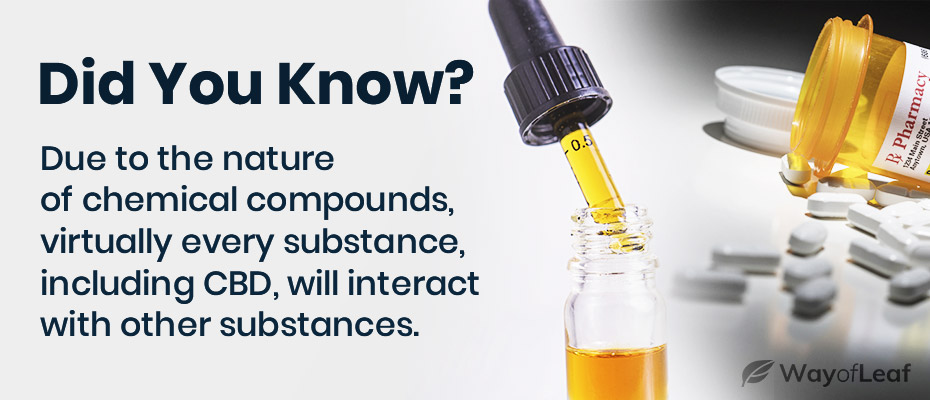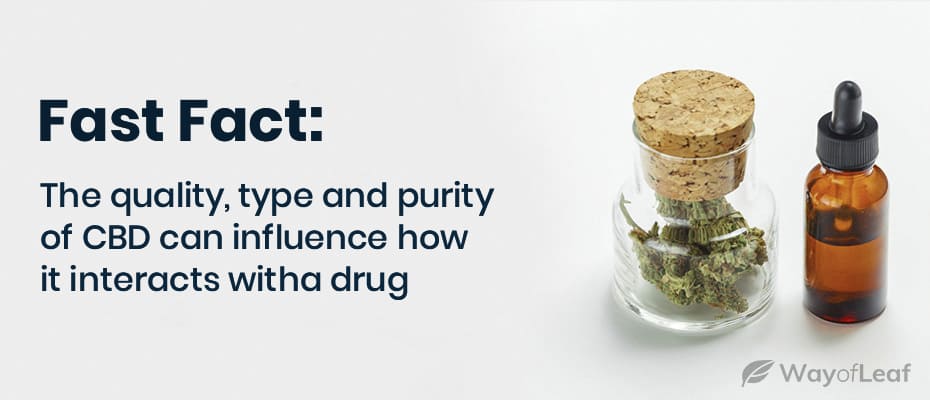A drug interaction is a reaction between medication and food, drink, or supplements. It also relates to a reaction between two or more drugs. It is also possible to have a drug interaction when you take medication while suffering from a particular medical condition. An example of this is using a nasal decongestant when you have high blood pressure.
Although medicine is supposed to improve our health, a drug interaction could cause harmful side effects; it could also increase or decrease the effectiveness of the medication. Critics point to the United States’ over-reliance on prescription and OTC drugs and suggest it is a heavily medicated society.
Medicine is meant to improve our health; however, drug interaction could cause harmful side effects.
The practice of using a myriad of supplements and drugs is known as polypharmacy. Medical professionals use the term when a person consumes five or more different types of medicine daily. However, a study by Qato et al., published in JAMA Internal Medicine in April 2016, found that almost 36% of American adults fall into the ‘polypharmacy’ category!
Aside from a penchant to overuse medication in general, our increased life expectancy has also played a major role in the excessive consumption of drugs. Conditions such as osteoporosis and cardiovascular disease are now more prevalent than ever before, and a fast, easy, and sometimes useful means of treating these issues is prescription medication.
How About CBD?
CBD is the latest treatment option for a wide range of medical conditions, although it is not FDA approved. Instead, sellers must ensure their CBD comes from hemp, and they are not allowed to make any medical claims. Even so, millions of patients around the world have begun trying cannabidiol to treat problems such as anxiety, depression, chronic pain, and osteoporosis.
The nature of chemical compounds means practically every substance interacts with another, and CBD is not exempt from this process. While the list of side effects associated with CBD is relatively short (pending further research); this situation only relates to healthy individuals who are not using other drugs.
As you may know, cannabidiol is the most prevalent non-intoxicating compound in marijuana and industrial hemp. It interacts with cannabinoid (CB) receptors throughout the body’s endocannabinoid system (ECS). CBD also inhibits the activity of a group of liver enzymes called cytochrome P450.
How CBD Affects Cytochrome P450
Cytochrome P450 (CYP450) enzymes help break down drugs and toxins that enter your body. As a result of CBD’s actions on CYP450, it deactivates the enzymes’ activity temporarily and alters the metabolization of other compounds.
Ultimately, this system metabolizes a large percentage of the drugs we consume. These enzymes break down the substances that enter our bodies and transform them into something the body can use.

When you use a hefty dose of CBD, it prevents the CYP450 enzymes from doing their job; thus, the body finds it hard to process specific medications. In case you were wondering, when a medicine is not metabolized properly, it remains in your system longer than is necessary and causes unintended adverse effects.
One interesting fact is that CBD interacts with drugs in the same way as grapefruit. Both substances inhibit the metabolic process in a similar fashion. Therefore, it is a good idea to avoid the same drugs when using CBD as you would when consuming grapefruit. Helpfully, several medications specifically tell you to avoid drinking grapefruit juice or eating the fruit! These drugs include, but are not limited to:
- Colchicine
- Alprazolam
- Dronedarone
- Felodipine
- Amiodarone
In this article, we look at several commonly used drug types and analyze their potential interaction with CBD.
1 – Antidepressants
According to the CDC, over 12% of Americans aged 12+ have used an antidepressant in the last month; and fluoxetine (Prozac and Sarafem) is the most commonly used. CBD is often used to combat depression, and it isn’t unusual for patients to use CBD and Prozac in a bid to beat the blues.
Fluoxetine is a selective serotonin reuptake inhibitor (SSRI) and is also used to treat bulimia, OCD, and anxiety. Typical side effects include sweating, diarrhea, abnormal dreams, and skin rash. Experts say SSRIs work by boosting the level of chemicals such as serotonin and dopamine in the brain.
SSRIs are among the best-researched medications around, but not everyone can find relief using a drug such as Prozac alone. Research suggests that CBD’s impact on the ECS helps improve symptoms of depression, primarily because of the ECS’ effect on mood, anxiety, and emotions.
To date, there is little evidence of negative drug interaction when using SSRIs in conjunction with CBD. Indeed, an increasing number of patients with depression report improvement when using both drugs together. However, CBD’s impact on the CYP450 enzymes means it could cause an increased amount of antidepressant medication to remain in the system.
A possible, albeit rare, side effect from this is a mild form of mania known as hypomania.
2 – Blood Thinners
Along with other cannabinoids in plants, CBD can increase the effects of blood-thinning drugs such as warfarin or drugs capable of thinning the blood, such as ibuprofen. A study by Grayson et al., published in Epilepsy & Behavior Case Reports in October 2017, discovered an interaction between warfarin and CBD.
The research team pointed out the importance of studying potential drug interactions involving cannabis products and any drug metabolized by the CYP450 enzyme system.
Once again, it is a case of the drug and CBD getting metabolized in the same pathway. The result is an elevated level of warfarin, which causes an increase in the drug’s blood-thinning effects. Make sure you monitor INR levels. INR is a test used to check the effects of warfarin. You may find that you need less than the recommended dose of the drug.
3 – Drugs for Epilepsy & Seizures
According to proponents, one of CBD’s plus points is the lack of an intoxicating ‘high.’ Therefore, an increasing number of parents are happy to use the cannabinoid to treat children with epilepsy. The remarkable case of Charlotte Figi was a massive boost to the industry.
Young Charlotte has Dravet’s Syndrome, and one of the symptoms is frequent seizures. Charlotte had hundreds of seizures each month. After using a high-CBD strain called Charlotte’s Web, the number of seizures fell to just two or three each month.
While research suggests that high doses of CBD oil could help treat the symptoms of epilepsy, Lester Bornheim found out something interesting back in 1992. It turns out that a low dose of CBD doesn’t provide antiepileptic effects but still inhibits CYP450 enzymes. The result is prolonged concentrations of antiepileptic drugs like norclobazam and clobazam, which cause more aggressive seizures.

At the 70th Annual Meeting of the American Epilepsy Society in January 2017, Jerzy P. Szaflarski, MD, Ph.D., discussed the results of a study into CBD and antiepileptic drugs. He said that CBD has a ‘significant’ interaction with drugs such as rufinamide, zonisamide, and topiramate.
A study by Chang, published in Epilepsy Currents in January 2018, reviewed the findings of Szaflarski and his team. Szaflarski’s research involved 81 volunteers, 42 of whom were children. From an initial dose of 5mg of CBD per kilogram of body weight daily, the dose was increased by another 5mg/kg daily every two weeks to a maximum 50mg/kg per day.
As part of the study, the team regularly checked serum antiepileptic drug (AED) levels to identify interactions between the drugs and CBD. Interestingly, while AED levels increased in several drugs, the level of clobazam decreased. Therefore, you may need less of most AEDs when using cannabidiol but might need more clobazam.
4 – Cold and Flu Drugs
There are even drug interactions between CBD and OTC cold and flu medication. Here is a quick list of the substances in various cold and flu drugs that are capable of causing side effects when used with CBD:
- Doxylamine: Found in drugs like Nyquil, this antihistamine could increase the calming or drowsy effects of CBD.
- Naproxen: Found in anti-inflammatory medicines such as Aleve, naproxen could reduce the effectiveness of CBD.
- Chlorpheniramine: Found in different antihistamines, chlorpheniramine could increase drowsiness.
- Pseudoephedrine: Found in decongestants such as Sudafed Congestion, this compound could increase the risk of serotonin syndrome when used with CBD.
- Pheniramine: Found in cold and flu combination products, this compound could increase drowsiness and general risk of side effects.
Other possible effects of drug interaction with cold and flu medicines are confusion, decreased motor function, and cognitive impairment.
5 – Antiretroviral Drugs
An estimated 40 million people worldwide live with HIV/AIDS. HIV weakens the immune system, which leaves patients vulnerable to infections. At present, antiretroviral drugs such as Saquinavir and Ritonavir are used to treat HIV/AIDS.
It seems that using these drugs with CBD can increase the efficacy and duration of cannabidiol but may also increase serum concentration and cause side effects. At the time of writing, research into a potential interaction between CBD and antiretroviral drugs has not been studied.
However, Costiniuk et al. published a report in the British Medical Journal in January 2019. The team outlined their intention to study the safety, tolerability, and effect on immune activation of oral cannabinoids in people living with HIV. Hopefully, we will soon learn a little more about how cannabis impacts the health of individuals with an HIV diagnosis.
Until we discover more, it is advisable to begin with a low dosage of CBD if using an antiretroviral drug.
6 – Anti-Anxiety Drugs
The dangers of mixing an anti-anxiety medication such as Xanax with opioids and alcohol are well known. However, we don’t yet have enough research to provide a conclusive outline of what happens when you mix CBD with such a drug. CBD’s effect on the CYP450 system means you will probably have an increased level of the drug in your blood. As a result, side effects such as confusion, loss of focus, and drowsiness are likely.
7 – Drugs to Control Blood Pressure
Beta-blockers are among the most popular options to reduce blood pressure. As CBD may also help keep your blood pressure under control, it is tempting to combine the two. However, you may experience some side effects. Beta-blockers are designed to reduce your heart rate by stopping the release of adrenaline, a stress hormone.
If you use CBD and beta-blockers together, there is a danger that your blood pressure will drop too quickly and lead to an unhealthily low rate. Side effects include feeling faint, dizzy, weak, and possibly going into shock.
What Drugs Should Not be Taken with CBD?
As previously highlighted in this article, taking CBD alongside drugs normally broken down by CYP450 enzymes increases the risk of potential interactions from high amounts of those drugs in the bloodstream.
In this section, we will address what drugs should not be taken with CBD. We will outline a list of drugs that are metabolized by CYP450 enzymes. If you are taking any of these types of drugs, you should consult with your doctor if you are considering taking CBD.
- Immunosuppressants – used in the treatment of autoimmune disorders such as psoriasis and rheumatoid arthritis
- Chemotherapeutics – used in the treatment of cancer
- Antidepressants – used to treat major depressive disorder (MDD) and other mood disorders, including anxiety and post-traumatic stress disorder (PTSD)
- Antipsychotics – used to treat schizophrenia and other psychotic disorders
- Opioids – used for pain relief and post-surgery
- Benzodiazepines – used for anxiety disorders and insomnia
- Calcium channel blockers – used for high blood pressure and other heart conditions
- Anti-epileptics – used in the treatment of epilepsy
- Proton pump inhibitors – used to treat acid reflux and stomach ulcers
- Propranolol – used to treat high blood pressure and sometimes physical symptoms associated with anxiety
- Warfarin – used to treat blood clots
If you are concerned about how CBD may interact with other medications that you are taking, then speak with your doctor to ensure that it is safe to do so.
Does The Form Matter For CBD Drug Interactions?
CBD topicals, including creams, balms, and lotions, are rubbed onto the skin surface, where CBD is directly absorbed and provides local pain relief.
Because topicals aren’t absorbed into the bloodstream at significant levels, topical CBD doesn’t have the same sedative effect as CBD oils or edibles. It also means a reduced risk for potential interactions with prescription drugs.
Lastly, topical CBD does not enter the liver in any significant amount. Therefore, it shouldn’t majorly interact with other medications broken down by CPY450 enzymes. These combined effects mean topicals are less likely to cause CBD drug interactions or enhanced drug side effects.
CBD’s Interaction with Other Medications: Conclusion
While there are a few studies that look at potential drug interactions between CBD and other medications, we are still in the dark, according to experts like Yasmin Hurd of Mount Sinai. She suspects that cannabidiol interacts with the majority of drugs taken orally.
It is a suggestion that makes sense. After all, approximately 60% of the drugs on the market interact with the CYP450 liver enzymes. When using these drugs with CBD, more of the medication gets into your system due to CBD’s ability to block these enzymes.
If you are using an OTC or prescription drug, it’s essential to consult with your physician before using CBD.
This is terrible news for patients who use drugs such as warfarin because if CBD blocks the metabolization of the blood thinner, the level of the drug becomes higher and could reach toxic levels. In the case of warfarin, using CBD with it may result in a dangerous hemorrhage or traumatic bleed.
If you use CBD with anti-anxiety drugs like Xanax or Ativan, it may lead to a higher degree of sedation. In rare instances, this combination could cause problems with your respiratory system. CBD could even increase the serum concentration (amount of a drug in your blood) when combined with drugs such as antihistamines, antiretrovirals, and beta-blockers.
While low doses of CBD are unlikely to cause drug interactions, there is no research that outlines the ‘safe’ amount. Ultimately, if you are using CBD to treat a specific medical condition, consult with your physician before considering its use when you are already using an OTC or prescription drug.
Additionally, if you are going to use CBD oil, always choose a high-quality product, like those in our list below!
FAQs
Can you take CBD with Benadryl?
Common side effects of Benadryl include drowsiness and increased sleepiness. Because these are also common side effects of CBD, taking Benadryl and CBD together may enhance these effects and could be potentially dangerous. Please speak with your physician first before taking CBD with Benadryl to ensure that it is safe to do so.
Can I take CBD oil and lorazepam?
Common side effects of lorazepam include drowsiness, fatigue, and problems with memory and coordination. Because of the sedating effects of CBD, taking lorazepam and CBD may enhance the side effects of lorazepam which could be dangerous, especially in situations like driving. Please speak with your physician first before taking CBD oil with lorazepam to ensure that it is safe to do so.
Can you take CBD with Prozac?
There is no published research to date about dangerous interactions between fluoxetine (Prozac) and CBD. However, fluoxetine is broken down by CYP2D6 enzymes into norfluoxetine and the action of norfluoxetine is largely responsible for fluoxetine’s antidepressant effect. As CBD inhibits CYP450 enzymes, which include CYP2D6, CBD may therefore inhibit CYP2D6 and prevent the production of norfluoxetine from fluoxetine, dampening fluoxetine’s effect. Please speak with your physician first before taking CBD with Prozac to ensure that it is safe to do so.
Can I take CBD oil with naproxen?
The body breaks down naproxen using CYP450 enzymes. Because CBD inhibits CYP450 enzymes, CBD could increase the amount of naproxen in the blood, meaning there may be an increased chance of experiencing unwanted side effects of naproxen. Please speak with your physician first before taking CBD with naproxen to ensure that it is safe to do so.



![The Marihuana Tax Act of 1937 [All You Need to Know]](https://wayofleaf.com/wp-content/uploads/2019/01/history-of-the-marihuana-tax-act-640x225.jpg)
![What Is “Mids” Weed? [Explained for the Cannabis Rookie]](https://wayofleaf.com/wp-content/uploads/2018/11/what-is-mids-weed-explained-for-the-cannabis-rookie-640x225.jpg)



![CBD Oil Third Party Quality Testing [Essentials]](https://wayofleaf.com/wp-content/uploads/2019/03/wol_1920x450-61-640x225.jpg)
![How to Know If You’re Allergic to Weed [Definitive Guide]](https://wayofleaf.com/wp-content/uploads/2017/04/marijuana-alergies-640x225.jpg)


